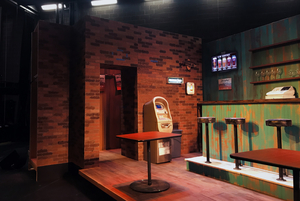BWW Blog: Lessons from Sweat

Before this all happened ("before this all happened"-a phrase now almost as tiring as "in these difficult times...") I was an assistant stage manager on my college's production of Lynn Nottage's Pulitzer Prize-winning play Sweat. The play was supposed to run after spring break-a break that we never came back from. We left our play where it sat, our dorm rooms like museum exhibits. Sensing the mounting stakes, we threw together an open dress rehearsal, desperate to get the play in front of an audience just once.
The play follows racial and economic tensions in a working-class Pennsylvania town not dissimilar from the one in which we all attend school. The community of the play was like many of our hometowns-casually ignorant and unwilling to accept change. In a way, Sweat opened my eyes to the extent of injustice and wrongdoing in our country. More importantly, however, Sweat taught me to recognize my privilege rather than deny it-to use it as a constructive ally rather than a bystander.
Now, over two months after Sweat was supposed to be performed, it feels more relevant than ever. Systemic injustices can no longer be ignored; they have been rightfully pushed to the forefront of American culture. With nothing to do except look at social media and the news all day, public outcry has become more effective and sweeping by the minute. Discomfort is key. Without criticism, without dissent, without putting those who should be scrutinized in the hot seat, there will never be change. That is the best way to make a difference.
My favorite type of theatre is the kind that does exactly that-a performance that delivers a gut-punch to the audience and leaves them uneasy in their velvet seats. You see it all the time: when the mob enters to lynch Tom Robinson in To Kill a Mockingbird, when Moritz utters his final "so dark..." in Spring Awakening, and when Jason refuses to let Oscar leave the bar in Sweat. These moments are not cheap, shocking plot points but rather breath-stealing, time-freezing junctures in their stories. Art is a weapon. The ability to make an audience feel something-whether it be discomfort, anger, or grief-is the ability to make a difference in the world. The audience leaves that theater to ruminate on what they just experienced and apply it to their lives.
The thing about a play like Sweat is that it presents all sides but does not ask you to universally sympathize. Some characters, despite all of their explaining and bargaining, are just plain wrong at the end of the day. Some characters refuse to change, while others desperately wish they could rewrite the past. Subtle prejudices remain and a brutal attack occurs. Sweat never suggests that everyone was right or justified, but rather that justifications can often masquerade as righteousness. Sweat does not hold back, and in times like these, it should not.
Comments
Videos


